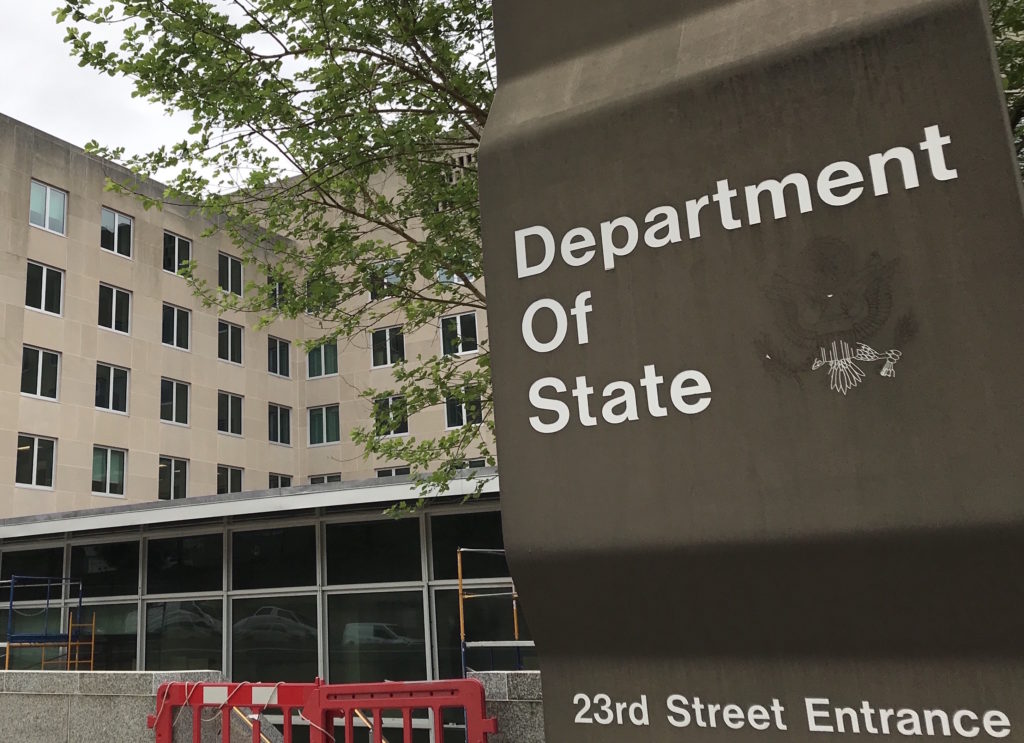On June 15, the U.S. State Department publicly designated two former Namibian government officials for their roles in “significant corruption.” According to the press statement, former Minister of Fisheries and Marine Resources Bernhardt Esau and former Minister of Justice Sakeus Shanghala are now “ineligible for entry into the United States” because of “their involvement in significant corruption.” The State Department also publicly designated Esau’s wife Swamma Esau and son Philippus Esau.
“In their official capacities…they were involved in corrupt acts that undermined rule of law and the Namibian public’s faith in their government’s democratic institutions and public processes, including by using their political influence and official power for their personal benefit,” the press statement explains.
Both Esau and Shanghala resigned from their government positions in November 2019, according to an article from Al Jazeera. Esau was arrested later in the month in connection to “allegations of corruption and money laundering in the Namibian fishing industry.” These events followed WikiLeaks’ release of documents on November 14, 2019 — the documents alleged corruption and misconduct in the Namibian fishing industry. A whistleblower who worked at Iceland-based multinational fishing company Samherji, Jóhannes Stefánsson, provided WikiLeaks with over 30,000 documents that WikiLeaks named the Fishrot Files.
Stefánsson was the Managing Director for Samherji and oversaw day-to-day operations for the company in Walvis Bay, Namibia, when he observed alleged corrupt activity at the company. In an exclusive interview with Whistleblower Network News (WNN), he described what he witnessed in regards to fishing quotas in Namibia. Samherji operates in areas where fishing quotas could be “bought, sold, or leased” — the quotas are a way for governments to regulate fishing and set “species-specific allowable catch totals,” according to Stefánsson’s interview.
Stefánsson alleged that “politicians and corrupt businesspeople” would sell fishing quotas to Samherji, which would then cash in with their large catches of fish like horse mackerel. He said in the interview that the alleged corruption “is about this big access to fishing quotas through this corruption with well-connected businesspeople and the politicians.” Stefánsson also said that this way of obtaining fishing quotas was abnormal: “Normally it is local people in the countries who have the fishing rights that get the fishing quotas and sell to companies like Samherji. Fishing rights should not go to politicians.”
Following WikiLeaks’ publication of the Fishrot Files, Al Jazeera, Icelandic broadcaster RUV, and Icelandic magazine Stundin published a joint investigation of the documents. According to the Al Jazeera article, both Esau and Shanghala were allegedly implicated in the Fishrot Files as taking “bribes” in return for helping Samherji obtain fishing quotas in Namibia and similarly manipulating the Namibian fishing industry. “Namibian government officials and Samherji executives laundered money to tax havens and some of the fishing company’s operations in other countries in a tax avoidance scheme,” Corruption Watch reported in a November 2020 article. “It also paid US$10-million (R154-million) in bribes to certain Namibian officials and businessmen.”
In regards to the public designation of Esau and Shanghala, the State Department’s press statement announced: “This designation reaffirms the U.S. commitment to supporting anticorruption reforms that are key to Namibia’s successful future. The United States continues to stand with all Namibians in support of democracy and the rule of law, and against those who would undermine these principles for personal gain. The Department will continue to use authorities like this to promote accountability for corrupt actors in this region and globally.”
A June 9, 2021 article from The Namibian states that Iceland rejected a request from Namibia to extradite three Icelandic Samherji executives who were allegedly involved in the Fishrot scandal. “According to Icelandic law, the country does not extradite its citizens. The laws are clear and it is banned,” Iceland’s public prosecution deputy director Helgi Magnús Gunnarsson told The Namibian. Gunnarsson also told the news outlet “that the Fishrot investigation in Iceland is not yet finalised, making it unclear whether all executives will face indictment.”
SeafoodSource reports that in “February 2021, prosecutors in Namibia charged 26 people, including three current Samherji employees, with racketeering, money laundering, and tax evasion.” According to The Namibian, “Namibia’s Anti-Corruption Commission (ACC), completed its investigation into the Fishrot scandal late last year. The commission has since submitted its findings to the prosecutor general, Martha Imalwa.”
For his whistleblowing in this case, Stefánsson won the 2021 WIN WIN Gothenburg Sustainability Award in April of 2021. “The prize of 1 million Swedish kronor ($120,000) will assist Stefánsson in receiving the medical treatment he has desperately needed since he first collapsed in agony in 2017,” according to previous WNN reporting. In March of 2021, Stefánsson told WNN that he believes he was poisoned in retaliation for his whistleblowing and has suffered physical effects ever since.
Read our Whistleblower of the Week article about Stefánsson on WNN here.
Watch an exclusive WNN video interview with Stefánsson here.
